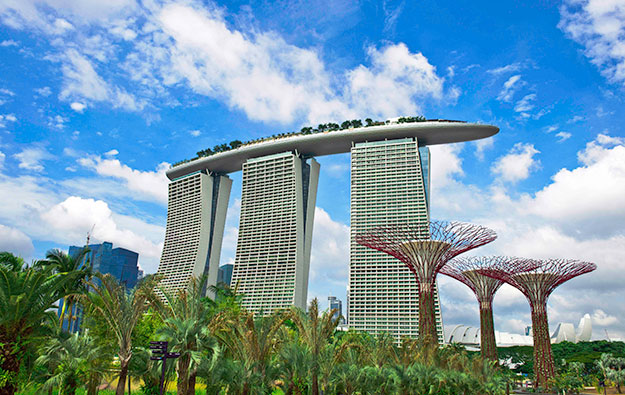Covid impact unclear on expansion of Singapore IRs: govt
Jan 11, 2022 Newsdesk Latest News, Singapore, Top of the deck

Singapore’s Minister of State for Trade and Industry, Alvin Tan Sheng Hui, said on Monday it was still unclear to what extent the expansion of the city’s two integrated resorts would be delayed as a result of disruptions to the construction industry wrought by the Covid-19 pandemic.
Singapore has a casino duopoly shared between Marina Bay Sands (pictured in a file photo), run by a unit of United States-based Las Vegas Sands Corp, and Resorts World Sentosa, run by Genting Singapore Ltd.
Talking in parliament on Monday, Mr Tan said the operators of the city’s two integrated resorts (IRs) had indicated that there would be potential delays in the completion of their expansion plans due to Covid-19-linked disruptions.
“This is not altogether surprising, nor unique to this project or this industry. Covid-19 has affected construction timelines, both locally and globally,” he said.
Mr Tan stressed both Las Vegas Sands and Genting Singapore remained committed to their expansion plans. He added that, under normal conditions, the expansions would contribute around SGD500 million (US$369 million) annually to Singapore’s gross domestic product, based on initial projections, directly creating up to 5,000 new jobs.
Las Vegas Sands and Genting Singapore have each stated publicly that the timetable for their respective Singapore resort expansions – initially scheduled to be completed by 2025 – would be negatively affected by disruption caused by the pandemic. Neither firm has yet issued any public statement on a revised timetable.
Mr Tan’s comments were made during a debate on Singapore’s Gambling Duties Bill, which the city-state’s parliament passed on Monday.
Singapore’s government said in 2019 it had agreed to the expansion of the city’s two integrated casino resorts. In return for their investment – an aggregate of SGD9 billion – the respective operators would continue to hold a duopoly on casino operations in the city-state through to 2030, it had been announced at the time.
The expansion plan for Marina Bay Sands includes adding a fourth tower and a 15,000-seat entertainment arena to the complex. Resorts World Sentosa is to expand several of its non-gaming offerings.
Singapore’s Gambling Duties Bill, now passed, includes a number of changes to the Casino Control Act, in line with what was announced by the Singaporean authorities in 2019. That includes extending the casino exclusivity period for the current two operators up to the end of 2030, and introducing a new tiered tax system on gross gaming revenue (GGR).
According to the new system, to become effective in March this year, the annual tax rate on mass GGR will go from a flat rate of 15 percent to a rate of 18 percent for the first SGD3.1 billion of GGR collected by the casino operator. Mass GGR in excess of SGD3.1 billion will be taxed at a rate of 22 percent.
Premium – or VIP – GGR is currently taxed at a flat rate of 5 percent in Singapore. According to the new tiered model, the first SGD2.4 billion of GGR will be taxed at a rate of 8 percent; premium GGR over that figure will be taxed at 12 percent.
Rating agency Fitch Ratings Inc said in November that Singapore casino revenue was likely to recover in 2022 to about 75 percent of 2019 levels.
According to respective filings of the two Singapore operators, their combined 2019 gaming revenue for that market was circa US$3.35 billion at current exchange rates. Resorts World Sentosa, reporting in local currency, generated just under SGD1.62 billion gaming revenue in full-year 2019, and Marina Bay Sands, just under US$2.17 billion.
Related articles
-
 Broker cuts Macau 2H mass GGR by 3pct...
Broker cuts Macau 2H mass GGR by 3pct...Jul 26, 2024
-
 MBS Tower 3 rooms revamp now by 2Q...
MBS Tower 3 rooms revamp now by 2Q...Jul 25, 2024
More news
-
 Donaco EBITDA up y-o-y to above US$4mln...
Donaco EBITDA up y-o-y to above US$4mln...Jul 26, 2024
-
 HK listed Palasino upgrades Czech...
HK listed Palasino upgrades Czech...Jul 26, 2024
Latest News
Jul 26, 2024
Border-casino operator Donaco International Ltd has achieved a 164.17-percent year-on-year increase in its latest quarterly group earnings before interest, taxation, depreciation and amortisation...Sign up to our FREE Newsletter
 (Click here for more)
(Click here for more)
Pick of the Day
”We’ve got more traction outside of Macau at the moment. But Macau’s going be a bigger focus for us”
David Punter
Regional representative at Konami Australia
Most Popular
 Sheraton brand to exit Londoner Macao, to be Londoner Grand July 25, 2024
Sheraton brand to exit Londoner Macao, to be Londoner Grand July 25, 2024  Macau regulator probes unlicensed gaming agents July 24, 2024
Macau regulator probes unlicensed gaming agents July 24, 2024  Philippines gives 20k aliens in POGOs 60 days to leave July 25, 2024
Philippines gives 20k aliens in POGOs 60 days to leave July 25, 2024  Philippines-listed DigiPlus says not affected by POGO ban July 24, 2024
Philippines-listed DigiPlus says not affected by POGO ban July 24, 2024  Sands China 2Q EBITDA down q-o-q amid low hold, renovation July 25, 2024
Sands China 2Q EBITDA down q-o-q amid low hold, renovation July 25, 2024






